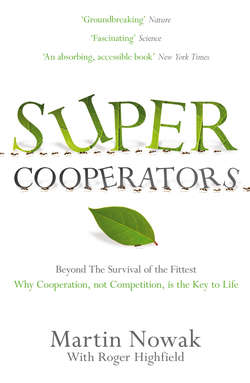Читать книгу SuperCooperators - Roger Highfield - Страница 11
На сайте Литреса книга снята с продажи.
The Prisoner’s Dilemma
ОглавлениеI believe that mathematical reality lies outside us, that our function is to discover or observe it, and that the theorems which we prove, and which we describe grandiloquently as our “creations,” are simply the notes of our observations.
—Godfrey H. Hardy,
A Mathematician’s Apology
At first, I did not appreciate the point of mathematics. I played with numbers during lessons in high school. I enjoyed solving problems. Arithmetic lessons were fun. Math was, all in all, quite interesting. But it was unclear to me what it was for. Perhaps it was a kind of mental gymnastics that had been devised—along with Latin—with the express purpose of making the children’s lives just that little bit harder.
At university I changed my mind. I had an epiphany, a spine-tingling moment when I realized that the precisely defined terms, equations, and symbols of mathematics are fundamental. I came to realize that mathematics holds the key to formulating the laws that govern the cosmos, from the grandest filaments, voids, and structures that stretch across the heavens to the peculiar behavior of the tiniest and most ubiquitous grains of matter. More important, it could say something profound about everyday life.
Mathematics is characterized by order and internal consistency as well as by numbers, shapes, and abstract relationships. Although you might feel that these concepts only inhabit the human mind, some of them are so real and absolute that they mean precisely the same thing to us as they would to a clever many-tentacled alien floating on an icy exoplanet on the far side of the universe. In fact, I would go even further than saying the ideas of mathematics are objective and concrete. The cosmos itself is mathematical: everything and anything that happens in it is the consequence of universal logic acting on universal rules.
Beyond the dimensions of space and time, mathematics inhabits a nonmaterial realm, one that is eternal, unchanging, and ever true. The empire of mathematics extends far beyond what we can see around us, beyond what we are able to perceive, and far beyond what we can imagine. There’s an unseen, perfect, and transcendental universe of possibilities out there. Even in the wake of cosmic degradation, collapse, and ruin, the inhabitants of other universes will still be there to gaze on the unending beauty of mathematics, the very syntax of nature. The truth really is out there and it can be expressed in this extraordinary language.
Some would go even further than this. They regard the mathematics that describes our cosmos as a manifestation of the thoughts of a creator. Albert Einstein once remarked: “I believe in Spinoza’s God, Who reveals Himself in the lawful harmony of the world.” For the seventeenth-century Dutch philosopher who had so impressed Einstein, God and nature were as one (deus sive natura), and the practice of doing math was tantamount to a quest for the divine. Whenever I think about this connection, I am always reminded of the last, thrilling lines of Goethe’s Faust:
All that is changeable / Is but refraction
The unattainable / Here becomes action
Human discernment / Here is passed by
Woman Eternal / Draws us on high.
My epiphany at university was that somewhere in this infinite, unimaginable ocean of truth there is a corporeal mathematics, a splash of math that you can feel, smell, and touch. This is the mathematics of the tangible, from the equations that govern the pretty patterns formed by the red petals of a rose to the laws that rule the sweeping movements of Mars, Venus, and other planets in the heavens. And of all those remarkable insights that it offers, I discovered that mathematics can capture the quintessence of everyday life, the ever-present tension that exists between conflict and cooperation.
This tension is palpable. It tugs at the emotions of participants in an internet purchase, where there is a temptation for buyers not to pay for goods and sellers not to send them. The tension surfaces when weighing whether to contribute to the public good, whether through taxes or licenses, or whether to clear up after a picnic on the beach or sort out items of everyday rubbish that can be recycled. One can feel this strain between the personal and public in transport systems too, which trust that enough people will pay for a ticket to ensure that they can operate sufficient buses, trains, and trams.
This tension between the selfish and selfless can be captured by the Prisoner’s Dilemma. Although it is a simple mathematical idea, it turns out to be an enchanted trap that has ensnared some of the brightest minds for decades. I myself became so infatuated with playing this extraordinary mathematical game that I changed my course at university and, at a stroke, changed the course of my life.
My work on the Dilemma gave me the first critical insights into why our traditional understanding of evolution is incomplete. It revealed why, in addition to the fundamental forces of mutation and selection, we need a third evolutionary force, that of cooperation. It provided a way to hone my understanding of the mechanisms that make someone go out of her way to help another. The Dilemma has played a key role in cementing the foundations for an understanding of the future of human cooperation.
